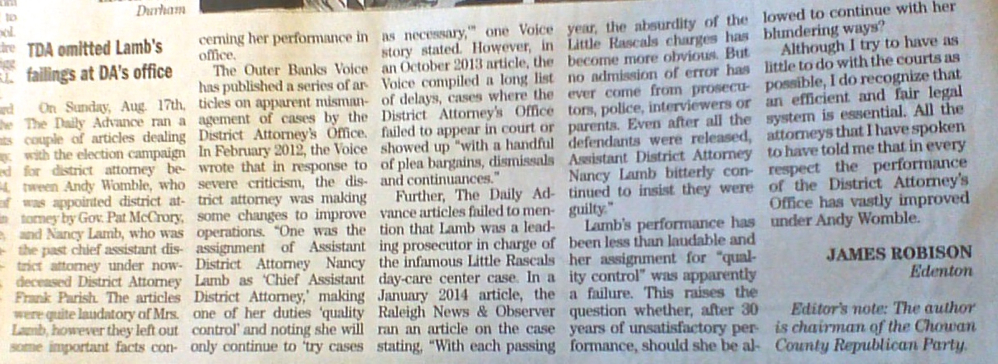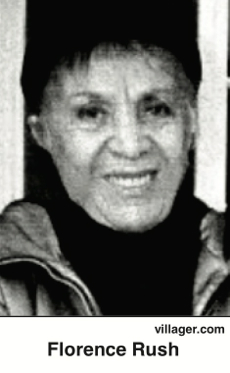Rascals case in brief
In the beginning, in 1989, more than 90 children at the Little Rascals Day Care Center in Edenton, North Carolina, accused a total of 20 adults with 429 instances of sexual abuse over a three-year period. It may have all begun with one parent’s complaint about punishment given her child.
Among the alleged perpetrators: the sheriff and mayor. But prosecutors would charge only Robin Byrum, Darlene Harris, Elizabeth “Betsy” Kelly, Robert “Bob” Kelly, Willard Scott Privott, Shelley Stone and Dawn Wilson – the Edenton 7.
Along with sodomy and beatings, allegations included a baby killed with a handgun, a child being hung upside down from a tree and being set on fire and countless other fantastic incidents involving spaceships, hot air balloons, pirate ships and trained sharks.
By the time prosecutors dropped the last charges in 1997, Little Rascals had become North Carolina’s longest and most costly criminal trial. Prosecutors kept defendants jailed in hopes at least one would turn against their supposed co-conspirators. Remarkably, none did. Another shameful record: Five defendants had to wait longer to face their accusers in court than anyone else in North Carolina history.
Between 1991 and 1997, Ofra Bikel produced three extraordinary episodes on the Little Rascals case for the PBS series “Frontline.” Although “Innocence Lost” did not deter prosecutors, it exposed their tactics and fostered nationwide skepticism and dismay.
With each passing year, the absurdity of the Little Rascals charges has become more obvious. But no admission of error has ever come from prosecutors, police, interviewers or parents. This site is devoted to the issues raised by this case.
On Facebook
Click for earlier Facebook posts archived on this site
Click to go to
Today’s random selection from the Little Rascals Day Care archives….
Click for earlier Facebook posts archived on this site
Click to go to
Today’s random selection from the Little Rascals Day Care archives….
Evidence of new day in Edenton? We can hope

Elizabeth City Advance, Sept. 6, 2014
Sept. 17, 2014
I’m doubly intrigued by this recent letter to the editor of the Elizabeth City Advance.
First, that an electioneering party official – in Edenton! – would cite the Little Rascals prosecution as an “infamous” example of Nancy Lamb’s failures.
Second, that 10 days after publication not a single correspondent has taken to the pages of the Advance to challenge the point!
Will no one today step forward to justify the state’s longest and costliest trial? To swear continuing allegiance to the credo of “Believe the Children”? To once again praise unreservedly the eight-year crusade Nancy Lamb waged against Bob Kelly?
It’s almost enough to make me think rationality has reclaimed the public mind in Edenton. If so, it took its own sweet time.
Day-care panic had roots in incest movement
 May 23, 2014
May 23, 2014
“….The widespread belief that sexual abuse of children is endemic to society is a relatively new notion. In fact, it can be traced to a particular moment in history: April 17, 1971.
“On that day the New York Radical Feminists, a group that at its height boasted no more than 400 members, held a groundbreaking conference on rape. For two days, women held forth on a subject long considered taboo…. A speech given by Florence Rush (was) the highlight of the event.
“Rush was an unlikely star for such a gathering. A middle-aged social worker, who had never been raped, she outlined statistical studies suggesting that sexual abuse of children, including incest, was a more widespread problem than was generally recognized….
“Before Rush’s speech, feminists had given little thought to incest. Author Andrea Dworkin recalled that before the conference ‘we never had any idea how common it was.’ In the decades following Rush’s talk, feminists more than made up for their earlier unawareness, competing with each other in elevating the number of victims….
“Believe the women. Believe the children. These refrains became the mantra of the incest movement. While the women’s movement would be enormously successful in turning sexual abuse – including incest – into a major public issue, women, ironically, would become the chief victims of the hysteria it generated.
“The obsession with this supposedly rampant sexual abuse played out in two ways: ‘Believe the women’ became the repressed memory hysteria. ‘Believe the children’ turned into the day-care hysteria….”
– From “Sex, Lies, and Audiotapes” by Rael Jean Isaac in the Women’s Quarterly (summer 2001) text cache
The road to the moral panic that would sweep up innocent day-care providers from North Carolina to New Zealand was a long one. If Florence Rush’s 1971 speech was one milestone early on, then perhaps the still-contentious 1988 conference of the International Society for the Study of Multiple Personality and Dissociation could be seen as the beginning of the end – although the allegations against the Edenton Seven weren’t yet even a gleam in a therapist’s eye….
What, no applause from Attorney General Easley?
June 17, 2013
“I don’t know if Bob Kelly and the staff of that now-infamous Edenton day care center abused those children… But I do know, beyond any reasonable doubt, that something is dreadfully wrong in that case, and I applaud the (N.C.) Court of Appeals ruling that ordered a new trial for Kelly and Kathryn Dawn Wilson. Everyone who cares about justice should join in a standing ovation for the court’s common-sense ruling.
“Fat chance of that.
“The prosecution, led by Attorney General Mike Easley, has already begun its campaign to discredit the ruling as a nitpicking exercise that found minor technicalities in the state’s longest and most expensive trial….”
– From “Justice unlikely for Kelly” by News & Observer columnist Dennis Rogers (May 9, 1995)
Easley said he would petition the N.C. Supreme Court to review the cases immediately: “The decision casts no doubt on the credibility of the children or the integrity of the investigation…. In both cases, the facts supporting the convictions were clear and overwhelming. (The appeals court) disregarded these facts and misapplied the law.”
The Wilson Daily Times opined that “Easley’s vow to appeal the overturning is futile, and he knows it. … Easley tried to play tough prosecutor… implying the convictions were thrown out because of technical indiscretions. But he well knows that the errors in the trials were substantial and egregious (and) made a mockery of justice.”
Four months later, when the N.C. Supreme Court upheld the Court of Appeals, Easley had lost his bravado. “All prosecutors know that cases involving children weaken with age,” he said. “A retrial in this matter will be extremely difficult.”
‘Understanding and Assessing’ ritual-abuse mythology
May 28, 2012
How would Bruce A. Robinson, founder of the comprehensive and widely respected ReligiousTolerance.org, describe the credibility now given ritual abuse?
“I am unaware of any child psychologist or similar specialist who still believes ritual abuse happened in child care facilities. I think there is a consensus that repeated direct questioning of young children will get them to reveal stories about events that never happened. Over time, these stories often become ‘memories.’ ”
Mr. Robinson, meet Kathleen Coulborn Faller, professor in the School of Social Work at the University of Michigan.
As previously noted, Dr. Faller in “Understanding and Assessing Child Sexual Maltreatment” (second edition, 2003) identifies herself as a true believer. Here’s how she makes her case:
■ “Responses to allegations of ritual abuse have undergone a transformation in the last 10 years, so that any case… elicits great skepticism. In fact, it is no longer au courant to believe in the existence of ritual abuse.”
Au courant? Does she really consider scientific research into children’s testimony to be some kind of fad, like pet rocks?
■ “The vigor of the attack against ritual abuse… reinforces the belief of some professionals, myself included, that there is substance to ritual abuse….”
What!? And where are these other professionals?
■ “Ultimately the backlash… resulted in the reversal of some criminal convictions involving ritual abuse (New Jersey v. Michaels, 1994; North Carolina v. Kelly, 1995)… ”
In fact, these convictions were overthrown not because public and professional opinion had begun to shift, but because their many legal defects were obvious to appeals courts.
● ● ●
I’ve again asked Dr. Faller to respond.











0 CommentsComment on Facebook